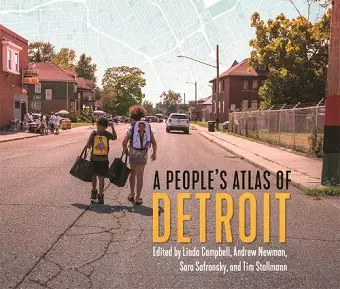A People's Atlas of Detroit
Andrew Newman editor Linda Campbell editor Sara Safransky editor Tim Stallmann editor
Format:Paperback
Publisher:Wayne State University Press
Published:19th Feb '20
Currently unavailable, our supplier has not provided us a restock date

In recent years, Detroit has been touted as undergoing a renaissance, yet many people have been left behind. A People's Atlas of Detroit, edited by Linda Campbell, Andrew Newman, Sara Safransky, and Tim Stallmann comes from a community-based participatory project called Uniting Detroiters that sought to use collective research to strengthen the organizing infrastructure of the city's long-vibrant grassroots sector and reassert residents' roles as active participants in the development process. Drawing on action research and counter-cartography, this book aims to both chart and help build movements for social justice in the city.
A People's Atlas of Detroit is organized into six main chapters. Chapter 1 excavates three centuries of Detroit's past to unearth the histories of racial citizenship that have shaped the city. Chapter 2 adopts a ground-level view of Detroit's contemporary landscapes and highlights the meanings that land holds for residents. Chapter 3 highlights urban farming as one of the key ways that Detroiters have been repurposing vacant land over the last several decades. Chapter 4 analyzes struggles over governance and finances between the state of Michigan and the city of Detroit and other majority African American cities. Chapter 5 moves beyond the gentrification debate-a dominant paradigm since the 1980s-which is neither the only nor the most important factor behind displacement. Chapter 6 focuses on residents' plans and mobilizations to reclaim and rethink public services in the city, including water, transit, and schools. As a whole, the book seeks to highlight and explain current visions for radical change-both in Detroit and cities around the world. A People's Atlas of Detroit weaves together maps, poetry, interviews, photographs, essays, and stories by over fifty residents, activists, and community leaders who offer alternative perspectives on the city's past, present, and future. This volume will reinforce conversations being had by scholars of many disciplines and will inspire communities to continue to raise their voices in the name of representation and change.
A People's Atlas of Detroit is a remarkable achievement. Not only is Detroit one of the most important cities to understand, but this book includes a multiplicity of forms of knowledge, which, when woven together, tell a powerful story. A People's Atlas of Detroit offers a new model and standard for critical urban geography. This book not only works to understand the many ways Detroit has come to help establish the urban fabric of the United States, but does so through a deeply embodied and popular mode of analysis that feels generative well beyond the specifics of the city itself. Detroit organizing has always been among the smartest, sharpest, and innovative work throughout people's history. This is a project that provides more evidence of this fact-a thoughtful, important resource developed by the people in the very best tradition of community-led and -centered research and analysis. A People's Atlas of Detroit proves once again that if we seek to understand a place, we must break with the extractive practice of traditional 'research' and listen to the people who make it what it is.
ISBN: 9780814342978
Dimensions: unknown
Weight: 333g
352 pages